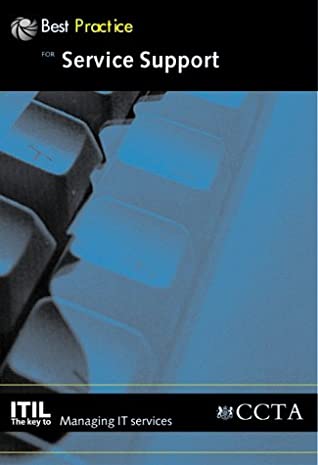

 |

|

The average rating for Service support based on 2 reviews is 5 stars.
Review # 1 was written on 2019-08-19 00:00:00 Paul Sespa Paul SespaInformation technology has become a key infrastructure for modern business and managing such an infrastructure in a timely, efficient and effective way has become critical. ITIL and COBIT provide two widely recognized and, more than one sense, complementary sets of ideas on how best to manage the IT services that underpin modern business operations. ITIL claims to provide "...a comprehensive, consistent and coherent set of best business practices for IT service management processes" whereas COBIT is more concerned with governance and control of IT operations. There are important and major differences between ITIL version 2 (which is what is described in this book) and version 3. If you are new to ITIL, it is probably wiser for you to skip this 2001 version of ITIL (ITIL version 2) and go straight to the new 2011 version of ITIL (version 3). For example, such a jump will save you the wear and tear of trying to figure out the difference between service delivery and service support processes which needlessly scars version 2. Be warned, this is a typical, but overly expensive, standards book written by many authors, and in spite of well-meant and careful attention to the writing, it does lapse into committee-speak, it is both denser than it seems at first sight and, sometimes, the definitions seem to fall maddeningly short. For example after admitting that it is not easy to define exactly what a service is and that "IT staff often confuse a ´service´ as perceived by the Customer with an IT system", they offer a "possible definition": "One or more IT systems which enable a business process". After the authors explicitly state that systems are not to be confused with services, they do exactly what they had warned against. Read chapter 4,Service Level Management, very, very carefully and before any of the other later chapters; it hold the key to understanding this service management framework. However, keep in mind that this is agreement-based approach to service runs radically counter to the service industry´s current approaches to providing customer-centered quality services. For example a hotel business or a waiter will not present its customers with written "service-level" agreement and ask them to sign them! ITIL grew out of the attempts of a very sophisticated and technically savvy bureaucracy (British government) to deal with the problems of IT management. This has led to a complex, interlinking set of processes which, I believe, requires sophisticated teamwork to pull off successfully. You can see this more clearly if you try to list with whom any of the process managers has to keep in touch in order to do his job properly. In spite of all the caveats, I believe that ITIL is an important IT management framework and this book was a key element in catapulting it upon a world stage. I certainly plan to keep this book until my poor third-world university library manages to scrape together funds to buy the version three collection of books so I can read them. |
Review # 2 was written on 2016-05-23 00:00:00 Florian Otto Florian OttoGiven this was written in 2004, this book was a huge contribution. It gets a lot of things right about how computer systems function in power dynamics, and accounts for a lot of misunderstandings about modern policies in a protocol-based world. At the current moment, many of us are still fighting policy-based battles in spaces that are entirely ignorant of the functions and possibilities of protocols, and this is a serious problem in an online world. Because of this, _Protocol_ is still one of the most relevant guides to thinking about information technology policy today. This book clarifies that the world we know is undergoing a cultural change towards distributed and decentralized networks that are based upon digital documents that are fundamentally supported through protocol systems: bits of code that afford people the ability to interpret online documents in a common way. He goes on to describe how this process is, in no way, a technologically neutral one. This book goes on to say that under these considerations of Deleuzian (and Foucauvian) notions of power, that we should reconsider how we think about Marxist material critical work. He suggests that in this world, all centralizing units of people are the enemy of those who find liberation in establishing and exploiting protocol: the enemy is corporations, institutions, the state, those groups which govern protocol (e.g. ICANN), and even unions. In fact, in the world of protocols, these groups ultimately become more of a pain than a threat as these groups must embrace the use of protocol to fight protocol. Ultimately, the revolutions are networks against networks in which the rhizomes that build them are networks of post-human cyborgs, incidental conceptual digital artists, hackers, and cyberfeminists. This book is a wild ride about the (Deleuzian) virtual possibilities of protocol from start to finish. According to Galloway, we have entered into a space of digital potentials that must reconsider post-human, post-structural Continental philosophy, and must leave behind present formations of Marxist criticism (aside from perhaps Marxist Aesthetics) and current economic governing ideologies in order to establish a better materialist form of criticism, design, and pragmatic theory. In some ways, if memory recalls, this seems to be a similar, more technologically up-to-date argument made by Benjamin Bratton in _The Stack_ and is somewhat seconded from a more legal perspective in Benkler's _The Wealth of Networks_. It also echos from the work of _The Cathedral and the Bazaar_. |
CAN'T FIND WHAT YOU'RE LOOKING FOR? CLICK HERE!!!